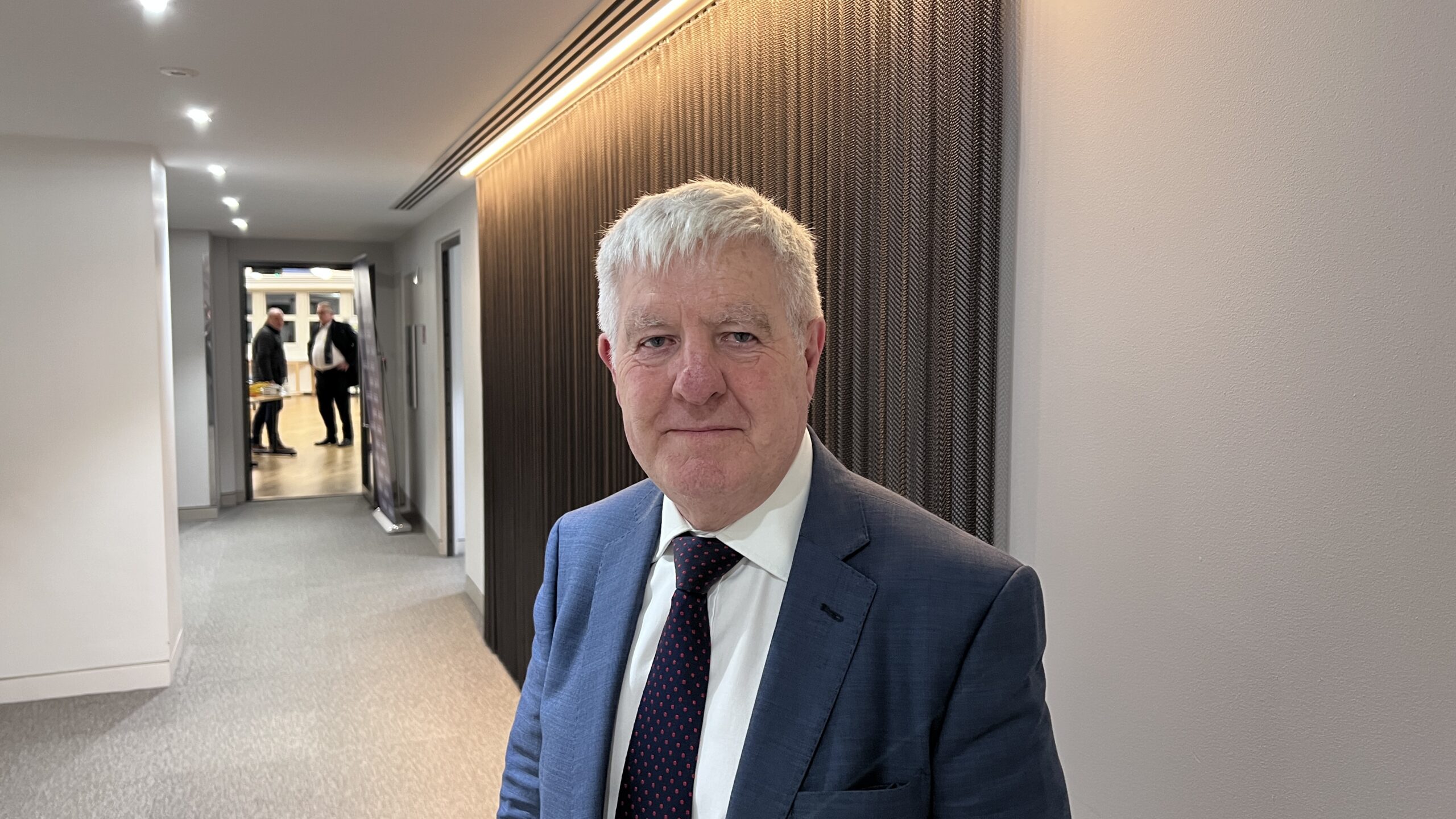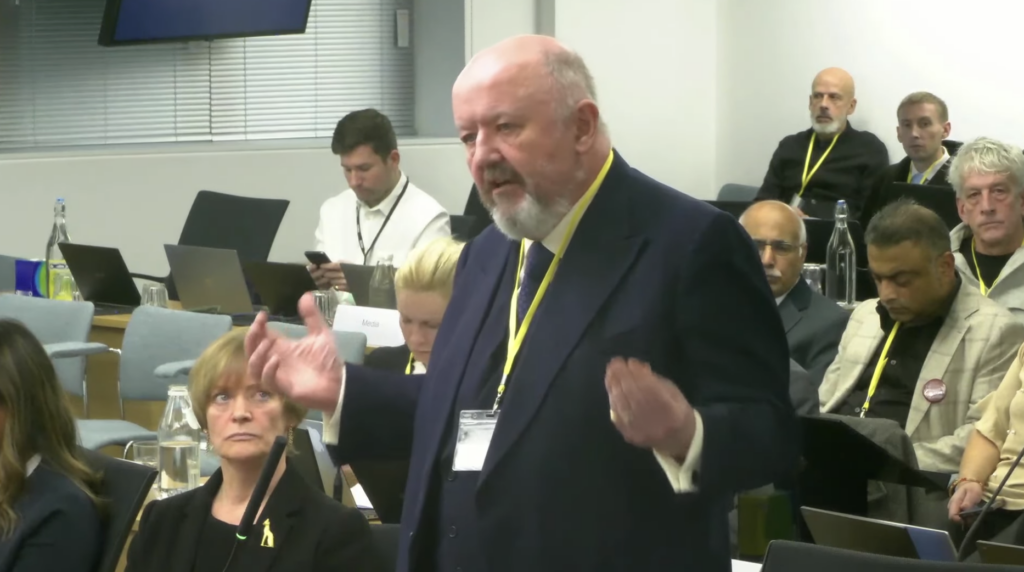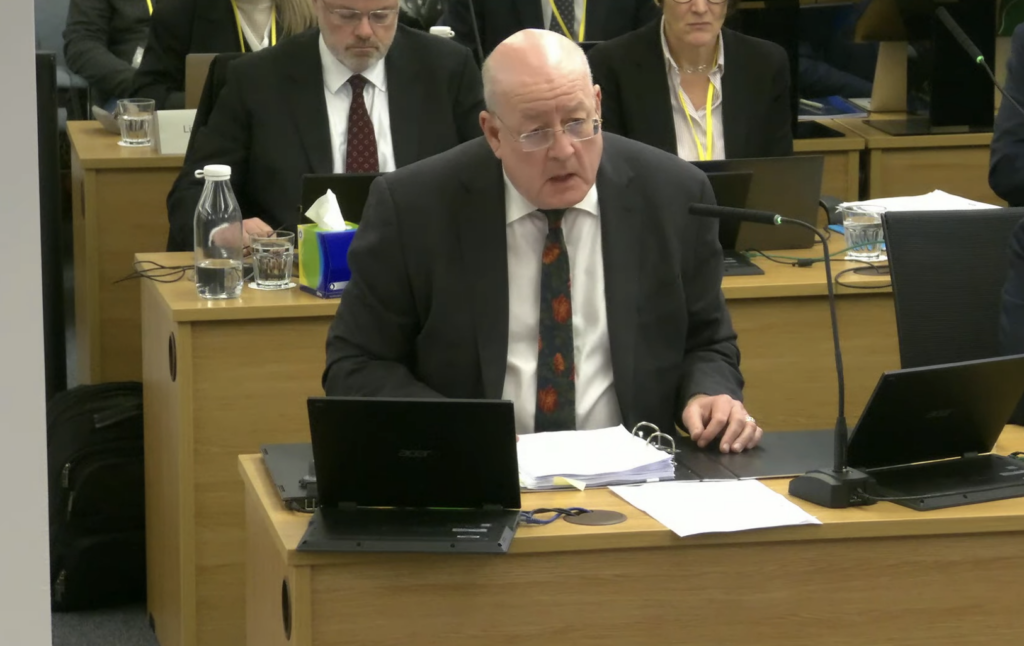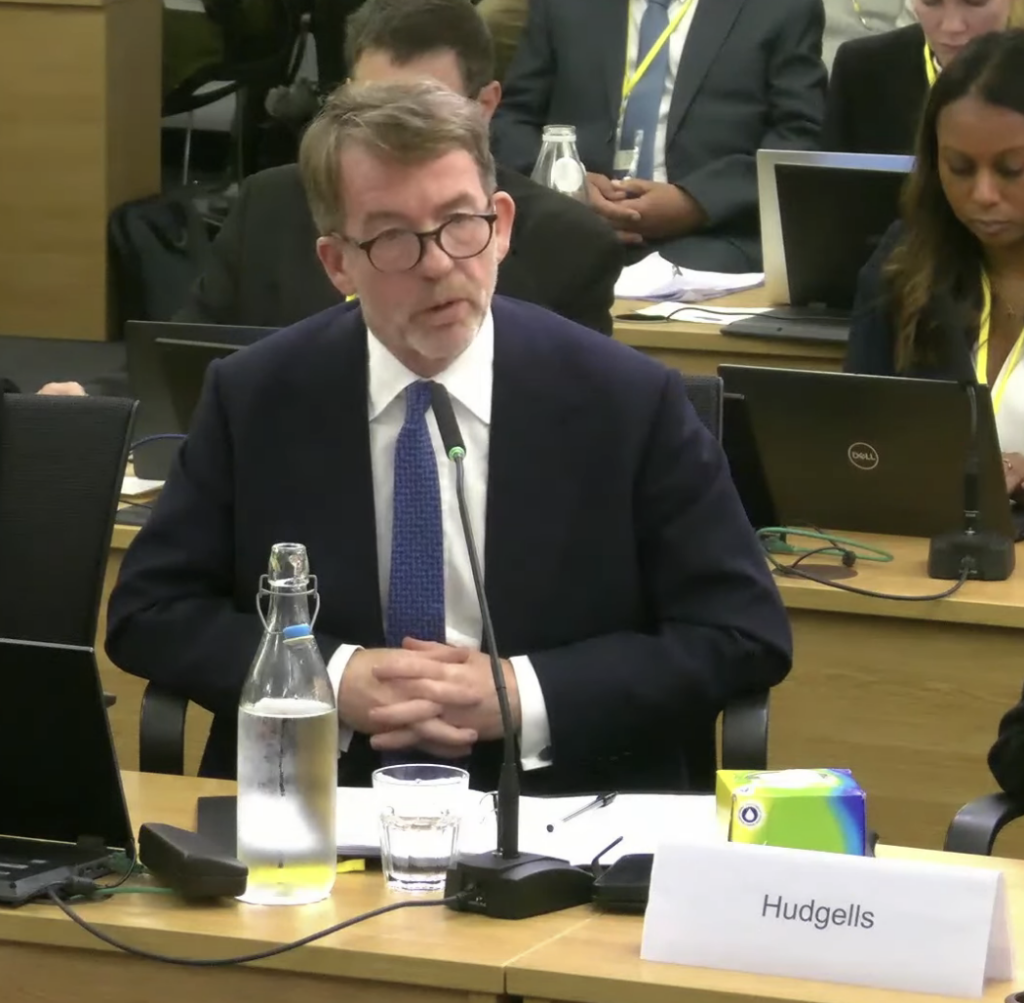
The hearing room was packed today as Subpostmasters, their supporters, lawyers, journalists and members of the public attended a long day of submissions at Aldwych House in London.
First out of the blocks was Ed Henry KC who sought to draw the line of conspiracy upwards through the executive to the Post Office board.
Henry spoke of the Post Office’s “inveterate contempt” for Subpostmasters, its “corrosive prejudice” against them and said the former Chair Alice Perkins with her henchman Chief Executive Paula Vennells knew exactly what they were doing:
“They wanted to keep the lid on it, and the lawyers were part of that strategy, along with PR, to enable them to do so, and that culture that directed that abusive policy was one that deprecated those who were — their professional obligations before their loyalty to the business. You’ll remember that extraordinary note from Paula Vennells about Susan Crichton. You’ll remember Alice Perkins complaining that Crichton hadn’t “marked” Second Sight, and you’ll remember later on under Tim Parker that the board wanted to take “pot-shots” at Seema Misra. That is the culture, sir, that you are dealing with, the culture that even infected the law.”

Henry got to the point which he felt was crucial. It turns (as so much does) on the Cartwright King barrister Simon Clarke’s Advice, written on seeing a draft of Second Sight’s interim report. Clarke told the Post Office that Fujitsu’s Gareth Jenkins had provided inaccurate information to the courts about bugs in Horizon and said a review of all Post Office prosecutions should take place as a result. Henry began with a conversation between the Post Office lawyer, Roderic Williams and Martin Smith from Cartwright King.
“Roderic Williams, during his telephone call with Martin Smith on 2 September 2013 wrote down eight words which spelt out the consequences for the Post Office should its wrongdoing ever be revealed… Those eight words were “damages, restitution of money received, loss of compensation”. This was an existential threat that had to be contained, and Roderic Williams knew that… He would have had no reason to withhold that knowledge… He would have been duty-bound and no doubt anxious to report what he knew to those with whom he worked or instructed.”
Henry noted that on the same day Williams spoke to Smith there was a flurry of emails involving Paula Vennells, including one from Andy Parsons, a civil lawyer from Bond Dickinson. Parsons advised against a “lessons learned” review of the handling of Second Sight investigation, stating:
“Should the review reveal any concerns about Horizon or branch accounting processes, then the Post Office may be obliged under criminal procedure rules to proactively pass this information to Subpostmasters involved in criminal proceedings and prosecutions, both ongoing and historic. In particular, recommendations for change could be interpreted as highlighting historic problems that would need to be disclosed.”
We know Vennells wrote in response: “This is clear to me. I appreciate you spending time to provide the advice; as you know I respect the views of our internal team and of Bond Dickinson. We need to take the right decision here and the timing of this is helpful. Alwen, can we speak first thing please.“
Henry told the Inquiry: “There is no record of what Paula Vennells discussed with Alwen Lyons, but the “lessons learned” review, like so many others, never happened. “This is clear to me… the timing is helpful.” In other words, I understand, I get what you’re saying, or what you’re not writing. We won’t go there.“
Stein Machine

Sam Stein KC was up next. He pointed out: “we don’t know the full extent of bugs, errors and defects in the current version of Horizon. The system is obsolete and careering out of control. It has no backup, and Fujitsu does not even dare turn it off, as they have no idea what will happen, when they try and turn it back on again.”
He said the Inquiry still hadn’t got to the bottom of some very important questions.
“There remain black holes. The first black hole is the issue of the helpline scripts. Our client group say that helpline staff members were reading from scripts and that the helpline staff didn’t even appear to understand what they were reading out. We’ve been tilting at this and asking for the scripts to be produced since the very first hearing in 2021. But here we are in December 2024 and still three years on, no scripts. Our clients simply don’t believe that they have vanished. The Post Office… has buried evidence, peddled the dishonest line about the robustness of the Horizon system and sought to protect its own reputation above the lives, health and mental health of sub-postmasters and the Post Office say they can’t find the scripts. What a shocker! The second black hole is the Subpostmaster’s money. Where has their money gone? …. We suggest that during the lifetime of Horizon, these figures in relation to monies put into suspense accounts would have been available. But, the Post Office has never wanted to look into this issue. They have let time take its toll on accessing this data.”
Stein raised his concern about holding the Post Office and government to account on compensation now the hearings are drawing to a close. He told the Inquiry Chair, Sir Wyn Williams, that he had the power to keep the Inquiry open after he had reported to focus on Subpostmaster redress, drawing on the example of the Infected Blood Inquiry:
“An inquiry does not end with the delivery of the report, but with the Chair’s, in this case, Sir, your notification to the minister that the inquiry has fulfilled its terms of reference. The terms of reference of this inquiry, at D, state that the inquiry shall assess whether the commitments made by the Post Office within the mediation scheme, including the historical shortfall scheme, have been properly delivered. Those terms of reference were set in mid-2021. Time has moved on, and we know that this scandal has led to the establishment of a number of schemes. We suggest, sir, that the terms of reference of this inquiry must be read in the light of all of the schemes established to provide financial restitution and compensation, and that in order to fulfill the terms of reference, the inquiry must ensure that they have been properly delivered…. We make this request, sir, because our clients do not trust the Post Office… because they believe that they will revert to a litigious approach within the redress schemes and when the process of this Inquiry concludes.”
Stein also brought up Fujitsu’s recent backsliding on a commitment it appeared to make to work with children of Subposmasters. In eleven months, it had done nothing, Stein said, with its European Director Paul Patterson complaining in evidence that Fujitsu “had no experience in devising such a scheme”.
Addressing himself to the Board of Fujitsu in Japan, Stein said “For a multinational company of the size and value of Fujitsu, a failure to do nothing for Subpostmasters other than hide behind your third-party legal status to avoid financial liability is shameful.”
Referring to a ludicrous document called “The Fujitsu Way” which espouses the company’s apparently empty values, Stein said:
“Fujitsu professes to hold itself to high standards. Sadly, we suggest to the Board of Fujitsu you are not honouring trust and exceeding or anyone’s expectations. You are not acting with ethics or integrity, and you are definitely not generating shared value for people, customers, partners, and community. If you claim you have learned lessons and are sorry and want to make amends, then empower Mr Patterson, the European Director of of Fujitsu, to do so. Establish, we suggest… a beneficial trust with sufficient funds to support the families of Subpostmasters in entrepreneurial pursuits, to assist with their education and potentially offer work experience. If your lawyers’ advice is that this could be seen as some sort of admission of direct liability to Subpostmasters, it is not. Instead this could be the start of something great. This is an opportunity to make something good arise from the ashes of this scandal, and it would support the restitution of Fujitsu’s good name.”
Only Moloney

Tim Moloney KC came next. He went back to the Clarke Advice and the actions of Alice Perkins and Paula Vennells:
“Ms Perkins asserts that she was unaware of the Clarke Advice until much later, that is during the appeals [in 2020/1]. She said it ought to have been provided to her by Ms Crichton [the then General Counsel] and she said “I see this as one of a number of failed turning points in this very sorry story.” Yet it’s Ms Vennells’ evidence that she told her Chair what she knew. We observe that this appears supported by the unsafe witness email of 21 October 2013. This has to be, at best, one of the most egregious examples of reckless incompetence on the part of each of the players.”
He was being polite. Moloney turned his attention towards the infamous board meeting of 16 July 2013 during which Susan Crichton had been about to present a paper on the Second Sight interim report. Instead the Chair kept Crichton outside whilst Vennells presented Crichton’s paper, and the Board was updated at the disastrous meeting of the 16th of July whilst General Council was held outside.
“Whatever the board was told,” said Moloney “it caused sufficient concern for wrongful prosecutions and the liability of Post Office and its directors asking for a briefing on the insurance position and tasking the team to update the insurers. Did no one in that meeting or any later meeting ask the lawyers directly about what exactly triggered the real risk to the business? And were there no repercussions for the board members who failed to ask such questions? The following things did happen. Members of the board were told that there was a need for a new witness. They knew this conversation was going on against the background of years of challenge to the Post Office’s prosecutions. Did no one really ask, why now? What’s wrong with the one we used to use? Again is this incompetence or might the absence of any question suggest that the reason had already been explained even if not recorded? And the inquiry heard that the board continued to be involved in conversations on changing on prosecutions and on prosecutions being paused. The suggestion that during this time there was no discussion of the true reason why the pause had become necessary again appears incredible.”
It is incredible, but whether it’s reckless incompetence or something worse may well be playing out in the criminal courts in a few years’ time.
The Inquiry’s final scheduled day is tomorrow. We will likely hear both Paula Vennells and Gareth Jenkins’ denial of criminal culpability, with representatives of the government, Fujitsu and the Post Office apologising profusely without admitting to much. Proceedings start at 9.30am.
I am writing a new book about the Post Office scandal called The Great Post Office Cover-Up. You can put your money down now for a limited edition signed, numbered, hardback copy. Doing so will help support an independent publisher, help support the Horizon Scandal and offer you the opportunity to join my secret email mailing list without having to make a donation. For a peek at the cover and more info about the book, click here!

Leave a Reply